From a sustainability perspective, landfills have become worse not better with regulation. Sustainability is putting things back where we found them, and landfills are now meticulously designed to prevent that. Modern landfills are kept dry so material can't decompose, and are boxed in with layers of plastic as well. We all should do whatever we can to avoid sending material to modern landfills.
So, do you know how much you are sending to landfills, and how you compare with others? Here's how to find out.
According to Statistics Canada the average Canadian sends 300 kg per year to landfills as residential waste. So, to start, simply weigh each bag of your residential garbage for a while on your bathroom scale, then divide by the number of people in your household. (Be honest now, don't skip spring cleaning or that old mattress!) That will tell you how you rate compared to the average Canadian.
Next, ask how you can reduce this. The answer almost certainly is, a lot! When I and my five children set out in the mid-1970s to try to live within one standard green garbage bag a week, we succeeded. Now that I'm an empty nester, I'm down to one recycled birdseed bag (smaller than the standard green bags) per month, 50 kg/yr, a sixth the average Canadian figure.
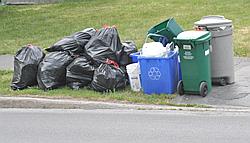
to this.
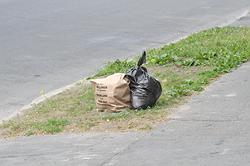
The three R's of garbage are Reduce, Reuse, Recycle.
Reduce
To start taking action towards environmental responsibility, translate Reduce as 'Refuse'. Whenever anyone offers you anything that will end up in landfill, try to say, "No".
Single-use bags are an easy place to start. Make or buy a few heavy fabric shopping bags. My daughter got her fellow high school students together and, with donated bolt ends of upholstery fabric from local fabric stores, made enough bags for all the students' families. I'm still using two of the three she brought home for us, over 20 years later. The ones used for food get washed with the weekly laundry. When buying single items that are already securely packaged, just say, "no bag, please" - your bill of sale is all you need. Enclose gifts in a fabric bag closed with a colourful yarn tie instead of one-use paper. That's a gift that welcomes regifting!
Plastic bags are not only light weight, but can be reused easily for storing food in a frig, a cupboard, or in school lunches. Large bags serve to contain landfill garbage. I haven't needed to buy storage or garbage bags for decades.
Get used to the truth about recycling paper, that half of it ends up in landfills. Paper is not just trees, it's plasticisers for wet strength and clays for smooth surfaces as well. Glossy brochures are often only half wood fiber by weight. And, paper needs long fibers to hold together, so fibers that are damaged during use or recycling end up in dumps too. Add toxic de-inkers and transportation-related pollution, and single-use paper bags are much worse for our environment than plastic (ILEA). A typical urban daily newspaper weighs 100 kg/year. TV and internet news are better than most newspapers now; there is a great selection of magazines at most civic libraries. And, a No Flyers sign on my mailbox keeps my black box free of almost 1000 marketing items per year.
Reuse
To begin, translate Reuse as 'Repair'. Whenever anyone offers you anything that can't be repaired when a minor thing breaks, look for another product. When that minor thing does break, fix it, rather than throwing out the whole thing and getting a new one.
When you can't reuse something that still works, offer it to someone else. Might those no longer worn clothes or old sofa still be good enough for Neighbourhood Services? Put things that might be reusable at the curb a day before your garbage pickup day so any scrounger can pick them up. Join with neighbours or friends in a garage sale. List items free at your nearest Used Canada site, major items that don't find a local market on Ebay.
Recycle
Finally, when all else fails, try to recycle. First, try to put it back where it came from. Run your mower over your lawn twice to cut clippings fine enough they can be left there, to act as natural fertiliser. As long as you don't use excessive artificial fertiliser or pesticides to kill natural soil bacteria, clippings will decompose into fertiliser long before next mowing day. Unless you have a very large tree, chopped deciduous leaves will too. I chop mine with a mower, then spread them on my garden.
All non-meat food waste, and paper that isn't acceptable in your black box, will decompose in a compost pile. In fact, the Composting Council of Canada estimates that half of all solid waste in Canada could be composted! An effective compost pile is open to the rain - water is absolutely necessary for natural decomposition. Natural decomposition doesn't smell or attract pests as long as no meat is present and there is adequate air circulation. Put it at the back of the back yard, surrounded by berry bushes that grab the nutrients as they enter the soil during rains as my mother did and her's before her. Of course nothing decomposes in northern winters, but I've always found two cubic meters adequate for year-round use. If you use clumping kitty litter, however, keep it away from a compost pile - it forms a gooey chemical blob that doesn't decompose for years. If you live in an apartment, or dispose of a lot of meat waste, campaign for a municipal green box program that composts such material at central sites as Ottawa now has.
Support local blue box (glass, metal and plastics recycling) and black box (paper) programs. Make recycling as easy as you can, with convenient containers in your kitchen and next to your computer. I have four, one covered for compost, one lined with a plastic bag from frozen veggies for landfill waste, one for paper and the last for blue box. Each of the last three are easily dumped into the city-provided containers in my garage whenever convenient.
Some cities, such as Ottawa, sponsor a "Take It Back" program to identify retailers of computers, TV's and appliances who look after proper disposal of your old unit when you buy a new one. High tech electronics in particular contain sufficient valuable metals to be worth specialized recycling. Foxy Recycle takes all of them in Ottawa, free.
You too can greatly reduce the material your household sends to landfills. For our environment and for our political peace of mind, it's worth it.
See also:
What is your Carbon Budget?
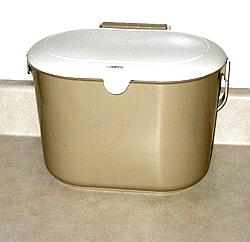
a compost container, next to the food preparation area
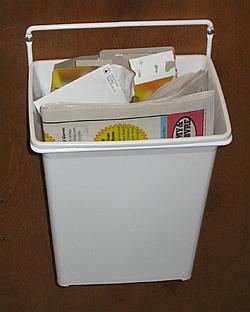
a paper container behind a kitchen cupboard door
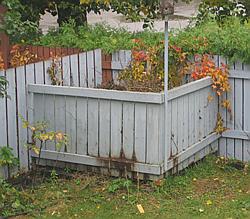
a compost pile in a back yard